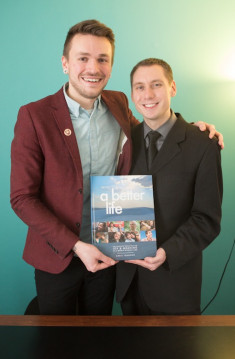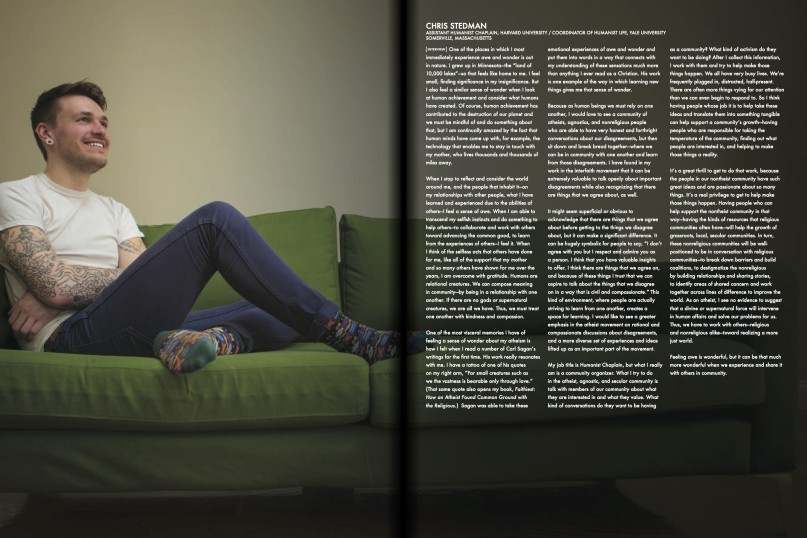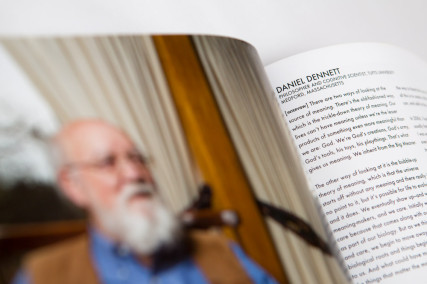Among the most persistent myths about atheists: that we are joyless, that we are immoral, that we don’t experience wonder, and that we are angry and bitter.
These stereotypes can be shattered when people are given an opportunity to get to know atheists. Building relationships seems to be one the best ways to challenge misconceptions about atheists—but a new book offers another way.
Photographer Chris Johnson’s forthcoming book A Better Life: 100 Atheists Speak Out on Joy & Meaning in a World Without God aims to humanize nontheists by highlighting a diverse group of atheists and sharing, in their own words, what gives them joy and meaning.
A Better Life—a skillfully produced coffee table book with beautiful color photos and a clean, inviting design—is the result of a big response to a unique idea. Johnson launched a Kickstarter project for A Better Life in February 2012, managing to raise over $100,000 in pledges from nearly 800 backers in just about two months—making it one of the highest-grossing publishing projects on Kickstarter.
The book, which will be released on January 1, 2014 (click here to preorder), profiles 100 atheists from a variety of backgrounds, including prominent atheists like Richard Dawkins, Daniel Dennett, and A.C. Grayling. And at least one out of the 100 will be familiar to readers of this column—I was honored when Johnson invited me to participate. As a sample of what the book looks like, here is my profile:
To celebrate the impending release of A Better Life, I asked Johnson about his motivations for creating it, why he included such diverse perspectives in the book, and what brings him joy and meaning. Below is our conversation.
Chris Stedman: Why did you decide to start this project? Was there a specific moment you knew you wanted to pursue it?
Chris Johnson: I was on a road trip with my brother through the Southwest and, as usual, I was taking tons of photos. My brother said, “You should do a book of your photography” and that’s really the seed that started the whole thing. We were listening to podcasts about religion and the two things just came together. [I] really wanted to do it, but I’m not a known photographer and never had done a book before. I didn’t know what to do next until I found Kickstarter and that really put the last piece of the puzzle in place in terms of how to get this thing off the ground.
CS: What was that experience—raising the funds for the project through Kickstarter—like? How did it feel to receive so much early support?
CJ: I always tell people it was the most stressful two months of my life, and that’s fairly accurate. [laughs] If you look at the graph of the fundraising period, it doesn’t spike up until the very, very end. As I said, I had never done anything like this before—so it was a huge learning curve for me. I really had to get out there and sell the idea of this book, and I’m incredibly grateful that it took off and struck a chord with people. What was really amazing though was the response from people from all over the world who believed in this project. Even those who were not in a position to financially support the project but thought this was an important book and helped let others know about it. Coincidentally, the Kickstarter end date was my thirtieth birthday, and since the project was successfully funded, it was a pretty great birthday present.
CS: You interviewed so many atheists for this book. I know you can’t play favorites, but who offered some of the most enriching interview experiences?
CJ: Chris Stedman, hands down! Next question? [laughs] Hmm, yeah, that’s a tough one. There have been so many amazing experiences associated with this project. Going to Yosemite to spend time with rock climber Alex Honnold was certainly one. I’m a huge fan of our National Parks and Yosemite is one of the most amazing places you’ll ever see, so that was pretty memorable. One thing that made this whole experience even more enriching for me was how excited people would get about being a part of it. The fact that people were taking time out of their busy schedules to meet with me and be a part of this really made me feel great. From swimming in San Francisco Bay, to a small cottage in the English countryside; there were so many wonderful experiences that I had in creating this book.
CS: One of the things that impresses me most about this project is how positive it is. It is, I think, an important contribution to atheism in the public square, in that it offers atheists an opportunity to name their values in the affirmative. It also helps to literally put a face—100 of them, to be exact—on atheism. Were you setting out to humanize atheists with this project? Were you intentional about highlighting diverse perspectives, given the stereotype we sometimes encounter of the atheist community being largely a collection of upper class heterosexual white men? Do you see this as a work of activism?
CJ: Thanks for saying that. It was very much my intention to not only show the many and varied faces of atheists but also highlight some within the movement who aren’t as well known. I wanted to have a good mix of famous and non-famous everyday people. I wanted it to be diverse and show that in addition to those you’re familiar with, atheists are your next-door neighbors, your airline pilot, your teacher, etc. It’s important to show that we come from all over the world, enjoy many different customs and traditions and run the spectrum in terms of professions, backgrounds, ethnicities, sexual orientations, ages, and so on.
CS: The atheists you interviewed for this book do provide many different perspectives. In that respect, a number of them have very publicly disagreed with one another about atheism. Why did you decide to bring in so many voices—including some that contradict one another?
CJ: Yeah, that was something I actually really wanted in the book. I wanted to show that we’re not a single block of people who all believe the same things. We are a diverse group of people with many different interests, ideas, philosophies, and passions, and I wanted to highlight that. So there are many different voices in the book, and some who disagree with each other on a range of issues and topics.
CS: So—it’s my turn to play Chris Johnson. What gives you joy and meaning?
CJ: That’s the million-dollar question isn’t it? [laughs] I’ve thought about this a lot, obviously. I get joy from so many things. From nature, to the people in my life and the many amazing experiences I’ve been lucky enough to have with them. Art plays a big part in my life and I’m constantly amazed how I can be moved to tears from a theatrical performance, or a film. The emotional connections we have are very important to me. Doing this book has certainly given me a tremendous amount of joy and satisfaction as well.
CS: Earlier this year, there was an incident concerning your stepmother that got a lot of attention among atheists. Can you briefly describe what happened and if, in your view, there’s a connection between it and why you feel this book is important?
CJ: My stepmom—my mom’s partner of over twenty years—Margaret Doughty was in the process of becoming a U.S. citizen. She was asked in the Immigration and Naturalization Service (INS) interview if she would be willing to take up arms in defense of the U.S. and she responded that, while she would help in a civilian capacity, she is a pacifist and would be a conscientious objector when it comes to taking up arms. When she was asked if her objection stemmed from a religious belief, she told them she wasn’t religious and this was simply an ethical issue to her. She was told that she could only be a conscientious objector if it was religiously based [and] that her application could be rejected because of this. So I sent a few emails to people I had met [because of this] book such as the folks at the Freedom From Religion Foundation, the American Humanist Association, my friend Kevin Davis over at the DividedUnderGod blog, among others. The atheist and secular humanist community came out and supported her and rallied. Under pressure, the INS approved the application and accepted Margaret’s ethical stance.
And yeah, I think there is a connection between actions like this and the book. Many people in this country think that once you take God out of the equation, that morality and ethics go as well. One of the things I want to show is how moral, ethical, compassionate, and wonderful atheists can be. We’re not boogeymen hiding under the bed. Hopefully if religious people read this book, they’ll see atheists a little bit differently and maybe things like this won’t happen again.
CS: How have atheists—and theists—responded to this book so far?
CJ: The response has been wonderful so far. When I was recently up at Harvard for the opening of the new Humanist Hub, I had a chance to reunite with five of the subjects in the book: you, Cameron Thornberry, Faisal Saeed Al Mutar, David Niose, and Dan Dennett. I brought along an advance copy of the book and everyone had a chance to see it for the first time. It was pretty cool! Even people who are religious have said great things about the project. Many religious progressives see this book as a way to humanize atheists to the religious conservatives who are much more hostile to nonbelievers than moderates. It’s nice to get support from various groups and organizations.









